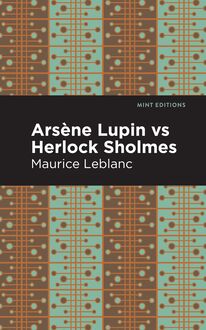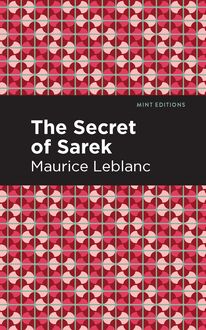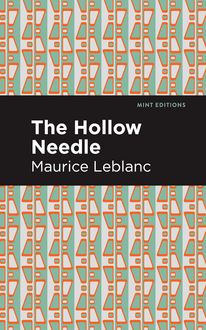-
 Univers
Univers
-
 Ebooks
Ebooks
-
 Livres audio
Livres audio
-
 Presse
Presse
-
 Podcasts
Podcasts
-
 BD
BD
-
 Documents
Documents
-
- Cours
- Révisions
- Ressources pédagogiques
- Sciences de l’éducation
- Manuels scolaires
- Langues
- Travaux de classe
- Annales de BEP
- Etudes supérieures
- Maternelle et primaire
- Fiches de lecture
- Orientation scolaire
- Méthodologie
- Corrigés de devoir
- Annales d’examens et concours
- Annales du bac
- Annales du brevet
- Rapports de stage
La lecture à portée de main
Vous pourrez modifier la taille du texte de cet ouvrage
Découvre YouScribe en t'inscrivant gratuitement
Je m'inscrisDécouvre YouScribe en t'inscrivant gratuitement
Je m'inscrisEn savoir plus
Vous pourrez modifier la taille du texte de cet ouvrage
En savoir plus

Description
Arsène Lupin, Gentleman Burglar (1907) is a collection of short stories by Maurice Leblanc. Originally published in Je sais tout, a popular French magazine, these stories launched Leblanc’s career as a leading international writer of crime fiction. Partly based on the life of French anarchist Marius Jacob, Arsène Lupin first appeared in print in 1905 as an answer to Sir Arthur Conan Doyle’s Sherlock Holmes. Blending crime fiction, fantasy, and mystery, Leblanc crafts original and entertaining tales of adventure starring one of the greatest literary characters of all time—Arsène Lupin, gentleman thief.
Arsène Lupin is the world’s greatest thief, an unmatched force for good whose exploits threaten the wealth and standing of France’s most wicked men. In this debut installment of Leblanc’s beloved series, Lupin uses his remarkable wit and chameleon-like ability to move undetected through aristocratic society in order to steal, trick, and cheat his way through life. Despite his criminal nature, he operates under a strict moral code, only taking from those who have taken from the poor all their lives. In this collection of early short stories, Lupin is sentenced to prison, makes a daring escape, cracks an impregnable safe, and makes the acquaintance of Sherlock Holmes, the legendary British detective. These nine tales are the perfect introduction to Leblanc’s legendary literary universe. Arsène Lupin, Gentleman Burglar is a story of romance, mystery, and crime that continues to astound over a century after it was published.
With a beautifully designed cover and professionally typeset manuscript, this edition of Maurice Leblanc’s Arsène Lupin, Gentleman Burglar is a classic of French literature reimagined for modern readers.
Sujets
Informations
| Publié par | Mint Editions |
| Date de parution | 24 mars 2021 |
| Nombre de lectures | 0 |
| EAN13 | 9781513295190 |
| Langue | English |
| Poids de l'ouvrage | 1 Mo |
Informations légales : prix de location à la page 0,0450€. Cette information est donnée uniquement à titre indicatif conformément à la législation en vigueur.
Extrait
Arsène Lupin, Gentleman Burglar
Maurice Leblanc
Arsène Lupin, Gentleman Burglar was first published in 1907.
This edition published by Mint Editions 2021.
ISBN 9781513292342 | E-ISBN 9781513295190
Published by Mint Editions®
minteditionbooks.com
Publishing Director: Jennifer Newens
Design & Production: Rachel Lopez Metzger
Project Manager: Micaela Clark
Typesetting: Westchester Publishing Services
C ONTENTS I. T HE A RREST OF A RSÈNE L UPIN II. A RSÈNE L UPIN IN P RISON III. T HE E SCAPE OF A RSÈNE L UPIN IV. T HE M YSTERIOUS T RAVELLER V. T HE Q UEEN ’ S N ECKLACE VI. T HE S EVEN OF H EARTS VII. M ADAME I MBERT ’ S S AFE VIII. T HE B LACK P EARL IX. S HERLOCK H OLMES A RRIVES T OO L ATE
I
T HE A RREST OF A RSÈNE L UPIN
I t was a strange ending to a voyage that had commenced in a most auspicious manner. The transatlantic steamship ‘La Provence’ was a swift and comfortable vessel, under the command of a most affable man. The passengers constituted a select and delightful society. The charm of new acquaintances and improvised amusements served to make the time pass agreeably. We enjoyed the pleasant sensation of being separated from the world, living, as it were, upon an unknown island, and consequently obliged to be sociable with each other.
Have you ever stopped to consider how much originality and spontaneity emanate from these various individuals who, on the preceding evening, did not even know each other, and who are now, for several days, condemned to lead a life of extreme intimacy, jointly defying the anger of the ocean, the terrible onslaught of the waves, the violence of the tempest and the agonizing monotony of the calm and sleepy water? Such a life becomes a sort of tragic existence, with its storms and its grandeurs, its monotony and its diversity; and that is why, perhaps, we embark upon that short voyage with mingled feelings of pleasure and fear.
But, during the past few years, a new sensation had been added to the life of the transatlantic traveler. The little floating island is now attached to the world from which it was once quite free. A bond united them, even in the very heart of the watery wastes of the Atlantic. That bond is the wireless telegraph, by means of which we receive news in the most mysterious manner. We know full well that the message is not transported by the medium of a hollow wire. No, the mystery is even more inexplicable, more romantic, and we must have recourse to the wings of the air in order to explain this new miracle. During the first day of the voyage, we felt that we were being followed, escorted, preceded even, by that distant voice, which, from time to time, whispered to one of us a few words from the receding world. Two friends spoke to me. Ten, twenty others sent gay or somber words of parting to other passengers.
On the second day, at a distance of five hundred miles from the French coast, in the midst of a violent storm, we received the following message by means of the wireless telegraph:
“Ars è ne Lupin is on your vessel, first cabin, blonde hair, wound right fore-arm, traveling alone under name of R…”
At that moment, a terrible flash of lightning rent the stormy skies. The electric waves were interrupted. The remainder of the dispatch never reached us. Of the name under which Ars è ne Lupin was concealing himself, we knew only the initial.
If the news had been of some other character, I have no doubt that the secret would have been carefully guarded by the telegraphic operator as well as by the officers of the vessel. But it was one of those events calculated to escape from the most rigorous discretion. The same day, no one knew how, the incident became a matter of current gossip and every passenger was aware that the famous Ars è ne Lupin was hiding in our midst.
Ars è ne Lupin in our midst! the irresponsible burglar whose exploits had been narrated in all the newspapers during the past few months! the mysterious individual with whom Ganimard, our shrewdest detective, had been engaged in an implacable conflict amidst interesting and picturesque surroundings. Ars è ne Lupin, the eccentric gentleman who operates only in the chateaux and salons, and who, one night, entered the residence of Baron Schormann, but emerged empty-handed, leaving, however, his card on which he had scribbled these words: “Ars è ne Lupin, gentleman-burglar, will return when the furniture is genuine.” Ars è ne Lupin, the man of a thousand disguises: in turn a chauffer, detective, bookmaker, Russian physician, Spanish bull-fighter, commercial traveler, robust youth, or decrepit old man.
Then consider this startling situation: Ars è ne Lupin was wandering about within the limited bounds of a transatlantic steamer; in that very small corner of the world, in that dining saloon, in that smoking room, in that music room! Ars è ne Lupin was, perhaps, this gentleman… or that one… my neighbor at the table… the sharer of my stateroom…
“And this condition of affairs will last for five days!” exclaimed Miss Nelly Underdown, next morning. “It is unbearable! I hope he will be arrested.”
Then, addressing me, she added:
“And you, Monsieur d’Andr é zy, you are on intimate terms with the captain; surely you know something?”
I should have been delighted had I possessed any information that would interest Miss Nelly. She was one of those magnificent creatures who inevitably attract attention in every assembly. Wealth and beauty form an irresistible combination, and Nelly possessed both.
Educated in Paris under the care of a French mother, she was now going to visit her father, the millionaire Underdown of Chicago. She was accompanied by one of her friends, Lady Jerland.
At first, I had decided to open a flirtation with her; but, in the rapidly growing intimacy of the voyage, I was soon impressed by her charming manner and my feelings became too deep and reverential for a mere flirtation. Moreover, she accepted my attentions with a certain degree of favor. She condescended to laugh at my witticisms and display an interest in my stories. Yet I felt that I had a rival in the person of a young man with quiet and refined tastes; and it struck me, at times, that she preferred his taciturn humor to my Parisian frivolity. He formed one in the circle of admirers that surrounded Miss Nelly at the time she addressed to me the foregoing question. We were all comfortably seated in our deck-chairs. The storm of the preceding evening had cleared the sky. The weather was now delightful.
“I have no definite knowledge, mademoiselle,” I replied, “but can not we, ourselves, investigate the mystery quite as well as the detective Ganimard, the personal enemy of Ars è ne Lupin?”
“Oh! oh! you are progressing very fast, monsieur.”
“Not at all, mademoiselle. In the first place, let me ask, do you find the problem a complicated one?”
“Very complicated.”
“Have you forgotten the key we hold for the solution to the problem?”
“What key?”
“In the first place, Lupin calls himself Monsieur R ______ .”
“Rather vague information,” she replied.
“Secondly, he is traveling alone.”
“Does that help you?” she asked.
“Thirdly, he is blonde.”
“Well?”
“Then we have only to peruse the passenger-list, and proceed by process of elimination.”
I had that list in my pocket. I took it out and glanced through it. Then I remarked:
“I find that there are only thirteen men on the passenger-list whose names begin with the letter R.”
“Only thirteen?”
“Yes, in the first cabin. And of those thirteen, I find that nine of them are accompanied by women, children or servants. That leaves only four who are traveling alone. First, the Marquis de Raverdan—”
“Secretary to the American Ambassador,” interrupted Miss Nelly. “I know him.”
“Major Rawson,” I continued.
“He is my uncle,” some one said.
“Mon. Rivolta.”
“Here!” exclaimed an Italian, whose face was concealed beneath a heavy black beard.
Miss Nelly burst into laughter, and exclaimed: “That gentleman can scarcely be called a blonde.”
“Very well, then,” I said, “we are forced to the conclusion that the guilty party is the last one on the list.”
“What is his name?”
“Mon. Rozaine. Does anyone know him?”
No one answered. But Miss Nelly turned to the taciturn young man, whose attentions to her had annoyed me, and said:
“Well, Monsieur Rozaine, why do you not answer?”
All eyes were now turned upon him. He was a blonde. I must confess that I myself felt a shock of surprise, and the profound silence that followed her question indicated that the others present also viewed the situation with a feeling of sudden alarm. However, the idea was an absurd one, because the gentleman in question presented an air of the most perfect innocence.
“Why do I not answer?” he said. “Because, considering my name, my position as a solitary traveler and the color of my hair, I have already reached the same conclusion, and now think that I should be arrested.”
He presented a strange appearance as he uttered these words. His thin lips were drawn closer than usual and his face was ghastly pale, whilst his eyes were streaked with blood. Of course, he was joking, yet his appearance and attitude impressed us strangely.
“But you have not the wound?” said Miss Nelly, naively.
“That is true,” he replied, “I lack the wound.”
Then he pulled up his sleeve, removing his cuff, and showed us his arm. But that action did not deceive me. He had shown us his left arm, and I was on the point of calling his attention to the fact, when another incident diverted our attention. Lady Jerland, Miss Nelly’s friend, came running towards us in a state of great excitement, exclaiming:
“My jewels, my pearls! Some one has stolen them all!”
No, they were not all gone, as we soon found out. The thief had taken only part of them; a very curious thing. Of the diamond sunbursts, jeweled pendants, bracelets and necklaces, the thief had taken, not the largest but the finest and most valuable stone
-
 Univers
Univers
-
 Ebooks
Ebooks
-
 Livres audio
Livres audio
-
 Presse
Presse
-
 Podcasts
Podcasts
-
 BD
BD
-
 Documents
Documents
-
Jeunesse
-
Littérature
-
Ressources professionnelles
-
Santé et bien-être
-
Savoirs
-
Education
-
Loisirs et hobbies
-
Art, musique et cinéma
-
Actualité et débat de société
-
Jeunesse
-
Littérature
-
Ressources professionnelles
-
Santé et bien-être
-
Savoirs
-
Education
-
Loisirs et hobbies
-
Art, musique et cinéma
-
Actualité et débat de société
-
Actualités
-
Lifestyle
-
Presse jeunesse
-
Presse professionnelle
-
Pratique
-
Presse sportive
-
Presse internationale
-
Culture & Médias
-
Action et Aventures
-
Science-fiction et Fantasy
-
Société
-
Jeunesse
-
Littérature
-
Ressources professionnelles
-
Santé et bien-être
-
Savoirs
-
Education
-
Loisirs et hobbies
-
Art, musique et cinéma
-
Actualité et débat de société
- Cours
- Révisions
- Ressources pédagogiques
- Sciences de l’éducation
- Manuels scolaires
- Langues
- Travaux de classe
- Annales de BEP
- Etudes supérieures
- Maternelle et primaire
- Fiches de lecture
- Orientation scolaire
- Méthodologie
- Corrigés de devoir
- Annales d’examens et concours
- Annales du bac
- Annales du brevet
- Rapports de stage




















